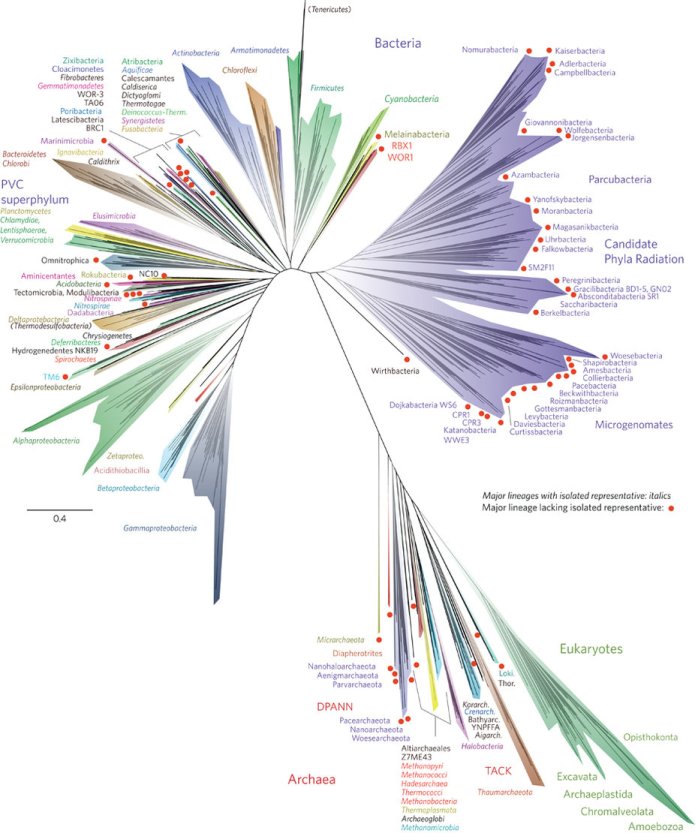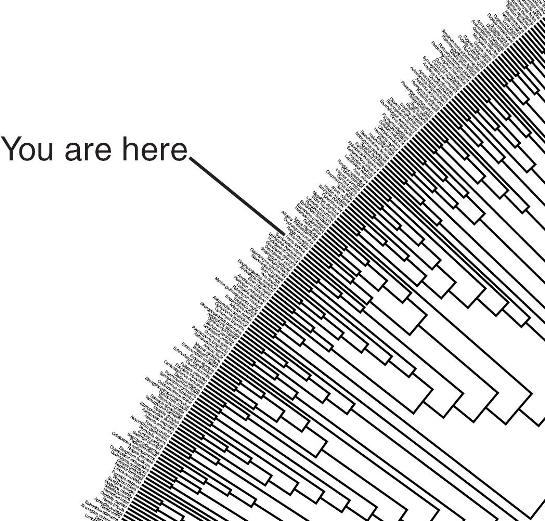Microbiomes at Risk: Difference between revisions
Siterunner (talk | contribs) No edit summary |
Siterunner (talk | contribs) No edit summary |
||
| Line 2: | Line 2: | ||
<big>'''Microbiomes and Climate Change'''</big> | <big>'''Microbiomes and Climate Change'''</big> | ||
https://en.wikipedia.org/wiki/Microorganism | |||
Trillions of (micro) species -- https://cosmosmagazine.com/life-sciences/earth-home-trillion-species | |||
Microbial 'new' Tree of Life -- http://www.nytimes.com/2016/04/12/science/scientists-unveil-new-tree-of-life.html | |||
Microbes on land, in the soil -- http://www.greenpolicy360.net/w/Category:Soil | |||
Microbes-Cyanobacteria in the oceans, blue-green life -- http://www.greenpolicy360.net/w/TinyBlueGreen | |||
:http://www.greenpolicy360.net/w/File:Chlorophyll_in_the_oceans_and_vegetation_on_land_world_map_2003_NASA-Goddard.jpg | |||
Microbiomes at risk -- http://www.greenpolicy360.net/w/Microbiomes_at_Risk | |||
Earth may be home to one trillion species -- http://www.archaeologynewsnetwork.blogspot.com/2016/05/earth-may-be-home-to-one-trillion.html | |||
:"Earth could contain nearly 1 trillion species, with only one-thousandth of 1 percent now identified" | |||
:Study results suggest that actually identifying every microbial species on Earth is an almost unimaginably huge challenge. To put the task in perspective, the [http://www.earthmicrobiome.org/ Earth Microbiome Project] -- a global multidisciplinary project to identify microscope organisms -- has so far cataloged less than 10 million species. | |||
"Of those cataloged species, only about 10,000 have ever been grown in a lab, and fewer than 100,000 have classified sequences... this leaves 100,000 times more microorganisms awaiting discovery -- and 100 million to be fully explored. Microbial biodiversity, it appears, is greater than ever imagined." | |||
<big><font color=green>'''○ ○ ○ ○ ○ ○ ○ ○ ○ ○ ○ ○ ○ ○ ○ ○ ○ ○ ○ ○ ○ ○ ○ ○ ○ ○ ○'''</font></big> | |||
http://e360.yale.edu/slideshow/is_climate_change_putting_br_-_worlds_microbiomes_at_risk/520/2/ | http://e360.yale.edu/slideshow/is_climate_change_putting_br_-_worlds_microbiomes_at_risk/520/2/ | ||
Researchers are only beginning to understand the complexities of the microbes in the earth’s soil and the role they play in fostering healthy ecosystems. Now, climate change is threatening to disrupt these microbes and the key functions they provide... | Researchers are only beginning to understand the complexities of the microbes in the earth’s soil and the role they play in fostering healthy ecosystems. Now, climate change is threatening to disrupt these microbes and the key functions they provide... | ||
| Line 44: | Line 63: | ||
http://e360.yale.edu/feature/microbiomes_at_the_roots_a_new_look_at_forest_ecology/2699 | http://e360.yale.edu/feature/microbiomes_at_the_roots_a_new_look_at_forest_ecology/2699 | ||
| Line 57: | Line 72: | ||
[[File:You are here on the cladogenetic tree m.jpg]] | |||
[[File:In the smallest creatures god sm.png]] | |||
[[Category:Atmospheric Science]] | |||
[[Category:Agriculture]] | [[Category:Agriculture]] | ||
[[Category:Biodiversity]] | [[Category:Biodiversity]] | ||
| Line 66: | Line 86: | ||
[[Category:Climate Change]] | [[Category:Climate Change]] | ||
[[Category:Ecology Studies]] | [[Category:Ecology Studies]] | ||
[[Category:Ecoregions]] | |||
[[Category:Microbiology]] | [[Category:Microbiology]] | ||
[[Category:Microorganism]] | [[Category:Microorganism]] | ||
[[Category:Natural Resources]] | [[Category:Natural Resources]] | ||
[[Category:Ocean Science]] | |||
[[Category:Soil]] | [[Category:Soil]] | ||
[[Category:Sustainability]] | [[Category:Sustainability]] | ||
Revision as of 14:16, 5 May 2016
Microbiomes and Climate Change
https://en.wikipedia.org/wiki/Microorganism
Trillions of (micro) species -- https://cosmosmagazine.com/life-sciences/earth-home-trillion-species
Microbial 'new' Tree of Life -- http://www.nytimes.com/2016/04/12/science/scientists-unveil-new-tree-of-life.html
Microbes on land, in the soil -- http://www.greenpolicy360.net/w/Category:Soil
Microbes-Cyanobacteria in the oceans, blue-green life -- http://www.greenpolicy360.net/w/TinyBlueGreen
Microbiomes at risk -- http://www.greenpolicy360.net/w/Microbiomes_at_Risk
Earth may be home to one trillion species -- http://www.archaeologynewsnetwork.blogspot.com/2016/05/earth-may-be-home-to-one-trillion.html
- "Earth could contain nearly 1 trillion species, with only one-thousandth of 1 percent now identified"
- Study results suggest that actually identifying every microbial species on Earth is an almost unimaginably huge challenge. To put the task in perspective, the Earth Microbiome Project -- a global multidisciplinary project to identify microscope organisms -- has so far cataloged less than 10 million species.
"Of those cataloged species, only about 10,000 have ever been grown in a lab, and fewer than 100,000 have classified sequences... this leaves 100,000 times more microorganisms awaiting discovery -- and 100 million to be fully explored. Microbial biodiversity, it appears, is greater than ever imagined."
○ ○ ○ ○ ○ ○ ○ ○ ○ ○ ○ ○ ○ ○ ○ ○ ○ ○ ○ ○ ○ ○ ○ ○ ○ ○ ○
http://e360.yale.edu/slideshow/is_climate_change_putting_br_-_worlds_microbiomes_at_risk/520/2/
Researchers are only beginning to understand the complexities of the microbes in the earth’s soil and the role they play in fostering healthy ecosystems. Now, climate change is threatening to disrupt these microbes and the key functions they provide...
The fact is that the earth has locked up a great deal of carbon and should it come unlocked as C02 it could dramatically speed up climate change. "The big question is whether soil will be a sink or source of greenhouse gases in the future..."
Researchers say that as the planet warms, essential diversity and function in the microbial world could be lost...
Whether microbes can go extinct is not settled science. When it comes to microbes, “everything is everywhere” has been the adage among researchers who thought that all types lived everywhere, though abundance varied. Yet as more is learned about these tiniest of critters, some scientists believe that likely isn't true, and there is concern that some key microbes could be rendered extinct before we know what they do.
○ ○ ○ ○ ○ ○ ○ ○ ○ ○ ○ ○ ○ ○ ○ ○ ○ ○ ○ ○ ○ ○ ○ ○
Soil Loss and Sustainable Ag: Serious Questions
○ ○ ○ ○ ○ ○ ○ ○ ○ ○ ○ ○ ○ ○ ○ ○ ○ ○ ○ ○ ○ ○ ○ ○
What About the Earth's Microbiome?
http://blogs.scientificamerican.com/guest-blog/what-about-earth-8217-s-microbiome/
○ ○ ○ ○ ○ ○ ○ ○ ○ ○ ○ ○ ○ ○ ○
See Unified Microbiome Initiative
https://www.whitehouse.gov/blog/2016/01/27/calling-all-microbiome-science-champions
Scientists and engineers are teaming up to answer fundamental questions about the microbiome – the billions of microorganisms that live on and in us, our homes, our food, and our planet. Questions such as, “What is a healthy microbiome?” and “How can we manage microbiomes to keep them resilient?” are applicable to microbiomes in habitats as diverse as oceans, soil, and the human body...
○ ○ ○ ○ ○ ○ ○ ○ ○ ○ ○ ○ ○ ○ ○ ○ ○ ○ ○ ○ ○ ○
Microbiology: Create a global microbiome effort
http://www.nature.com/news/microbiology-create-a-global-microbiome-effort-1.18636
○ ○ ○ ○ ○ ○ ○ ○ ○ ○ ○ ○ ○ ○ ○ ○ ○ ○ ○ ○ ○ ○ ○ ○ ○ ○
Microbiomes at the Roots: A New Look at Forest Ecology
http://e360.yale.edu/feature/microbiomes_at_the_roots_a_new_look_at_forest_ecology/2699
-- Green Policy / Global & Local
-- #Earth360 #EarthPOV #EarthObservations #EarthScience
-- #PlanetCitizens #PlanetEarth #EcologyStudies #EnvironmentalSecurity #Sustainability


